跨文化交际案例
跨文化交际不成功的案例

跨文化交际不成功的案例
1. 麦当劳在印度
在20世纪90年代,麦当劳试图在印度扩展其业务。
然而,麦当劳的典型汉堡和肉类菜肴并不适合印度人的饮食习惯,因此没有受到欢迎。
此外,印度的文化和信仰禁止食用牛肉,而麦当劳的其中一种汉堡就是以牛肉作为主要成分。
在未能适应当地饮食习惯的情况下,麦当劳最终退出了印度市场。
2. 比萨宜家在中国
比萨宜家是一家意大利披萨连锁店,在中国开设了多家分店。
公司所选用的品牌名称“比萨宜家”,在中文中音近“屄死你家”的粗俗语言,因而在当地受到负面反应。
此外,比萨宜家在中国分店所提供的菜品也未能符合当地食物传统,因此未能获得中国消费者的广泛认可。
3. 成功咖啡在菲律宾
英国咖啡连锁店成功咖啡试图在菲律宾扩展业务,但没有考虑到当地消费者倾向于喝冷饮,而成功咖啡的菜单主要是以热咖啡和茶为主。
此外,店内的装饰和氛围也与当地文化和咖啡文化不太相符,未能吸引菲律宾的消费者。
4. 外企在日本
外国企业在日本也面临着许多文化差异的挑战。
例如,日本公司经常强调集体决策和团队合作,而许多西方企业则更注重个人表现和工作独立性。
此外,在日本文化中,劳动力的稳定性和长期受雇是重要的价值观,而美国和欧洲的企业往往更注重短期成果和利润。
这些文化差异可能导致沟通和协作的问题,从而妨碍了外国企业在日本的发展。
跨文化交际教学的经典案例

跨文化交际教学的经典案例
跨文化交际教学的经典案例有很多,以下是其中一些:
1. 红豆衬衫的广告语:红豆衬衫的广告语“红豆情深”在中国非常流行,但将其翻译成英文“Red Bean, the more you eat, the more you toot”却
引发笑场。
这是因为中文中的“情深”具有深厚、真挚的情感含义,而在英
文中却变成了“吃得越多,放屁越多”,给人不雅之感。
2. 麦当劳改名:麦当劳在台湾市场推出新品牌形象,将原本的“I’m lovin’ it”改成了“I’m thrilin’ it”,以吸引更多年轻人。
然而,这个新口号在
推广中遭遇了巨大的困境,因为消费者并不买账。
最终,麦当劳不得不放弃
了这个口号,重新使用原来的“I’m lovin’ it”。
3. 百事可乐广告:百事可乐曾经在中国市场推出了一支非常感人的广告,广告中描述了一对恋人因为一瓶百事可乐而结缘的故事。
然而,在广告播出后
不久,就因为广告中出现了一名黑人男演员而被中国网民质疑。
虽然百事可
乐公司很快就删除了广告并发表了道歉声明,但这个事件仍然给百事可乐的
品牌形象造成了不小的打击。
这些案例都表明,在跨文化交际中,我们需要更加注意不同文化之间的差异
和特点,并尊重这些差异和特点。
同时,我们需要更加谨慎地选择语言和表
达方式,以避免出现不必要的误解和冲突。
跨文化交际公共外交案例
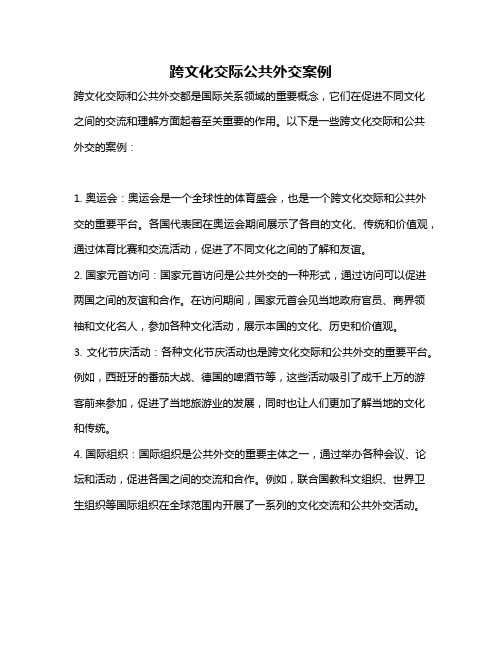
跨文化交际公共外交案例
跨文化交际和公共外交都是国际关系领域的重要概念,它们在促进不同文化之间的交流和理解方面起着至关重要的作用。
以下是一些跨文化交际和公共外交的案例:
1. 奥运会:奥运会是一个全球性的体育盛会,也是一个跨文化交际和公共外交的重要平台。
各国代表团在奥运会期间展示了各自的文化、传统和价值观,通过体育比赛和交流活动,促进了不同文化之间的了解和友谊。
2. 国家元首访问:国家元首访问是公共外交的一种形式,通过访问可以促进两国之间的友谊和合作。
在访问期间,国家元首会见当地政府官员、商界领袖和文化名人,参加各种文化活动,展示本国的文化、历史和价值观。
3. 文化节庆活动:各种文化节庆活动也是跨文化交际和公共外交的重要平台。
例如,西班牙的番茄大战、德国的啤酒节等,这些活动吸引了成千上万的游客前来参加,促进了当地旅游业的发展,同时也让人们更加了解当地的文化和传统。
4. 国际组织:国际组织是公共外交的重要主体之一,通过举办各种会议、论坛和活动,促进各国之间的交流和合作。
例如,联合国教科文组织、世界卫生组织等国际组织在全球范围内开展了一系列的文化交流和公共外交活动。
5. 媒体交流:媒体交流是跨文化交际和公共外交的重要手段之一。
通过媒体报道、电视节目和网络平台等渠道,人们可以更加了解不同国家的文化和价值观,同时也可以通过媒体交流促进不同文化之间的理解和友谊。
总之,跨文化交际和公共外交在促进国际交流和理解方面起着至关重要的作用。
通过各种形式的跨文化交际和公共外交活动,人们可以更加了解不同国家的文化和价值观,增进友谊和合作。
跨文化交流的经典案例
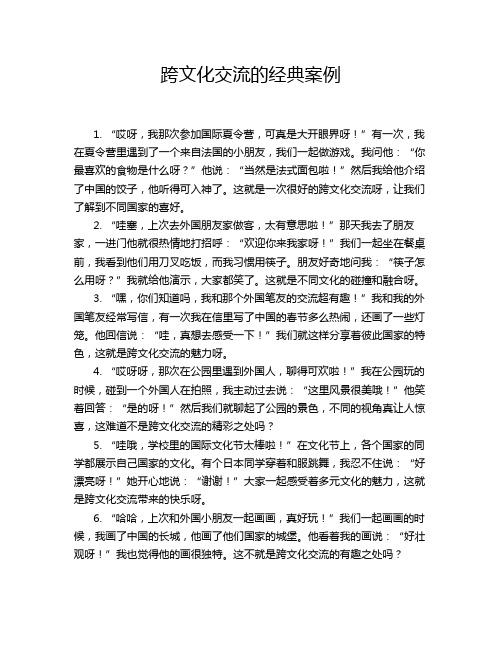
跨文化交流的经典案例1. “哎呀,我那次参加国际夏令营,可真是大开眼界呀!”有一次,我在夏令营里遇到了一个来自法国的小朋友,我们一起做游戏。
我问他:“你最喜欢的食物是什么呀?”他说:“当然是法式面包啦!”然后我给他介绍了中国的饺子,他听得可入神了。
这就是一次很好的跨文化交流呀,让我们了解到不同国家的喜好。
2. “哇塞,上次去外国朋友家做客,太有意思啦!”那天我去了朋友家,一进门他就很热情地打招呼:“欢迎你来我家呀!”我们一起坐在餐桌前,我看到他们用刀叉吃饭,而我习惯用筷子。
朋友好奇地问我:“筷子怎么用呀?”我就给他演示,大家都笑了。
这就是不同文化的碰撞和融合呀。
3. “嘿,你们知道吗,我和那个外国笔友的交流超有趣!”我和我的外国笔友经常写信,有一次我在信里写了中国的春节多么热闹,还画了一些灯笼。
他回信说:“哇,真想去感受一下!”我们就这样分享着彼此国家的特色,这就是跨文化交流的魅力呀。
4. “哎呀呀,那次在公园里遇到外国人,聊得可欢啦!”我在公园玩的时候,碰到一个外国人在拍照,我主动过去说:“这里风景很美哦!”他笑着回答:“是的呀!”然后我们就聊起了公园的景色,不同的视角真让人惊喜,这难道不是跨文化交流的精彩之处吗?5. “哇哦,学校里的国际文化节太棒啦!”在文化节上,各个国家的同学都展示自己国家的文化。
有个日本同学穿着和服跳舞,我忍不住说:“好漂亮呀!”她开心地说:“谢谢!”大家一起感受着多元文化的魅力,这就是跨文化交流带来的快乐呀。
6. “哈哈,上次和外国小朋友一起画画,真好玩!”我们一起画画的时候,我画了中国的长城,他画了他们国家的城堡。
他看着我的画说:“好壮观呀!”我也觉得他的画很独特。
这不就是跨文化交流的有趣之处吗?7. “哎呀,我跟那个外教老师的互动好难忘!”外教老师上课特别有趣,有一次他讲他们国家的节日,我们都听得津津有味。
我举手问:“和我们的节日有什么不同呢?”他详细地给我们解释,让我们了解到更多,这就是跨文化交流的意义呀。
跨文化交际案例

一、谁没有负责?一项调查针对日本母亲和美国母亲的调查:如果孩子没有把应缴回的单子交到学校,谁应该负责?日本母亲大都觉得是自己的过失,美国母亲大都认为是学校没有尽责。
二、飞利浦照明公司某区人力资源副总裁(美国人)与一位被认为具有发展潜力的中国员工交谈。
想听听这位员工对自己今后五年的职业发展规划以及期望达到的位置。
中国员工并没有正面回答问题,而是开始谈论起公司未来的发展方向、公司的晋升体系,以及目前他本人在组织中的位置等等。
讲了半天也没有正面回答副总裁的问题。
副总有些大惑不解,没等他说完已经有写不耐烦了,因为同样的事情之前已经发生了好几次。
“我不过是想知道这位员工对于自己未来五年发展的打算,想要在飞利浦做到什么样的职位罢了,可为何就不能得到明确的回答呢?”谈话结束后,副总忍不住向人力资源总监甲抱怨道。
“这位老外总裁怎么这样咄咄逼人?”谈话中受到压力的员工也向甲谈苦。
作为人力资源总监,甲明白双方之间不同的沟通方式引起了隔阂,虽然他极力想双方解释,但要完全消除已经产生的问题并不容易。
三、一个美国女学生处于好意把泰国同屋洗干净的内衣和袜子叠放在她的枕头上,结果这个泰国女生觉得受到了侮辱,一定要搬离宿舍。
四、一对美国夫妇到巴基斯坦度假,住在一个看起来蛮吸引人的市场旁的旅馆。
夫妇决定隔天到市场去看看有没有值得买的纪念品。
一觉醒来,闷热的天气,叫人有点透不过气。
先生一身轻便的短袖休闲衣裤,太太穿着短袖花纹上衣,粉红美观的紧身短裤,两人脚底都套着凉鞋。
到市场时,这对夫妇发觉几乎每个人都严厉地瞪着他俩,指指点点,有的甚至口发恶言。
俩夫妇觉得很纳闷,赶紧转头,回到旅馆。
为什么市场里的人对这对夫妇的态度如此恶劣呢?五、An American went to Chinese home. He was offered some tea. Just when the first cup was about to finish, more tea was added. The visitor drank the second cup. Then the cup was filled the third time. Then he drank it, then…until the visitor was quite full. Why?六、One cold winter day in a Chinese city, Wang Lin on his way to the library met an American professor who knew very little about China. After greeting him, Wang said: “It’s rather cold. You’d better put on more clothes.”But the professor didn’t appear happy on hearing this.七、张斌作为汉语志愿者在泰国的小学教汉语。
跨文化交际案例
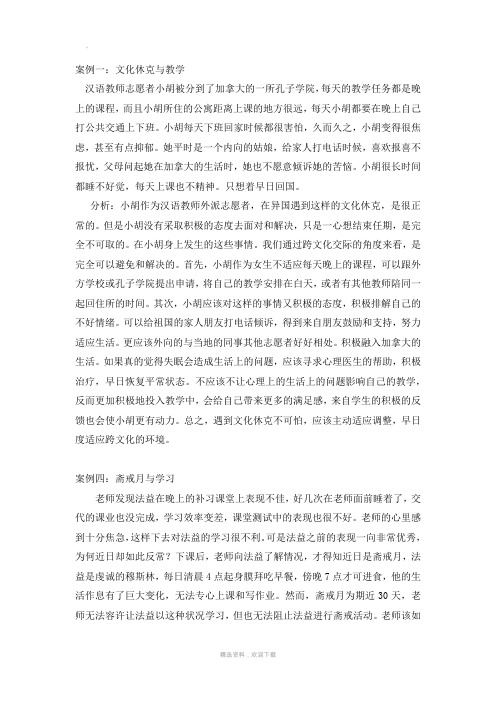
案例一:文化休克与教学汉语教师志愿者小胡被分到了加拿大的一所孔子学院,每天的教学任务都是晚上的课程,而且小胡所住的公寓距离上课的地方很远,每天小胡都要在晚上自己打公共交通上下班。
小胡每天下班回家时候都很害怕,久而久之,小胡变得很焦虑,甚至有点抑郁。
她平时是一个内向的姑娘,给家人打电话时候,喜欢报喜不报忧,父母问起她在加拿大的生活时,她也不愿意倾诉她的苦恼。
小胡很长时间都睡不好觉,每天上课也不精神。
只想着早日回国。
分析:小胡作为汉语教师外派志愿者,在异国遇到这样的文化休克,是很正常的。
但是小胡没有采取积极的态度去面对和解决,只是一心想结束任期,是完全不可取的。
在小胡身上发生的这些事情。
我们通过跨文化交际的角度来看,是完全可以避免和解决的。
首先,小胡作为女生不适应每天晚上的课程,可以跟外方学校或孔子学院提出申请,将自己的教学安排在白天,或者有其他教师陪同一起回住所的时间。
其次,小胡应该对这样的事情又积极的态度,积极排解自己的不好情绪。
可以给祖国的家人朋友打电话倾诉,得到来自朋友鼓励和支持,努力适应生活。
更应该外向的与当地的同事其他志愿者好好相处。
积极融入加拿大的生活。
如果真的觉得失眠会造成生活上的问题,应该寻求心理医生的帮助,积极治疗,早日恢复平常状态。
不应该不让心理上的生活上的问题影响自己的教学,反而更加积极地投入教学中,会给自己带来更多的满足感,来自学生的积极的反馈也会使小胡更有动力。
总之,遇到文化休克不可怕,应该主动适应调整,早日度适应跨文化的环境。
案例四:斋戒月与学习老师发现法益在晚上的补习课堂上表现不佳,好几次在老师面前睡着了,交代的课业也没完成,学习效率变差,课堂测试中的表现也很不好。
老师的心里感到十分焦急,这样下去对法益的学习很不利。
可是法益之前的表现一向非常优秀,为何近日却如此反常?下课后,老师向法益了解情况,才得知近日是斋戒月,法益是虔诚的穆斯林,每日清晨4点起身膜拜吃早餐,傍晚7点才可进食,他的生活作息有了巨大变化,无法专心上课和写作业。
跨文化交际例子

跨文化交际例子
以下是 6 条关于跨文化交际的例子:
1. 有一次我去国外旅行,在当地的餐厅吃饭。
我想要一杯热水,就跟服务员说“hot water”,结果服务员一脸茫然。
后来才知道,在那个国家,他们不说“hot water”,而是说“warm water”,哎呀,这就是跨文化交际的小插曲哇!
2. 还记得有个朋友跟我分享,他去参加一个国际会议。
别人跟他说“How do you do”,他很自然地就回答了自己的真实情况,却没意识到这只是一种打招呼的方式,闹了个小笑话呢,这可真是跨文化交际中让人忍俊不禁的事呀!
3. 我认识一个外教,每次和我们聊天的时候,他总是很难理解我们说的一些成语和俗语。
比如说“画蛇添足”,解释半天他还是似懂非懂的,这难道不是跨文化交际有趣的一面吗?
4. 有一回参加一个国际交流活动,和来自不同国家的人一起做游戏。
玩到一个猜谜语的环节,我们出的一些谜语对于他们来说简直是难如登天,而他们出的我们也一头雾水,哈哈,这跨文化的碰撞真让人印象深刻啊!
5. 咱身边有个同事找了个外国女朋友,有次女朋友过生日,他按照咱这儿的习惯送了一双鞋,没想到女朋友不太高兴。
后来才知道,在她的文化里送鞋不太吉利,你说这算不算跨文化交际中的意外呀!
6. 曾经在一部外国电影里看到,男主去女方家做客,按照自己国家的习惯大大咧咧地坐在沙发上,却没注意到在那个国家这是不礼貌的行为。
哎呀呀,跨文化交际就是这么充满未知呢!
观点结论:跨文化交际真是充满了各种意想不到和有趣的事情,需要我们不断学习和理解不同文化的差异呀!。
《跨文化交际》案例

《跨文化交际》案例Case 1 Litz is a professor of cross —cultural communication in a university in Finland. She invited her Chinese students home for an evening party. The schema from Litz‟s point of view includes the following:1. Giving invitation: by phone / by mail 2. Prepare everything before the arrival of guests 3. Receiving Receiving guests: guests: guests: open open open the the the door door door / / / express express express welcome welcome welcome / / / take take take their their their overcoats overcoats overcoats / / introduce guests / offer them drinks / make them comfortable 4. Serving food: set the table / soup first / main course / desert 5. Post dinner activities: chat / play music / offer more drinks 6. Seeing guests off: thank them for coming / good night Litz‟s evening evening party party party was was was not not not very very very successful, successful, successful, because because because she she she was was was upset upset upset by by by one one one of of of her her guests. Here was the initial conversation between Litz and Lin: Litz: (opens the door ) Oh, Lin, how nice you could come! ) Oh, Lin, how nice you could come! Lin: It‟s not difficult to find your house.Litz: Come on in. Lin: (comes in ) Litz: Can I take your coat? Lin: No, thanks. Litz: Ok, this way please. Lin: (take off her coat and hangs it ) Analysis : Litz was hurt because Lin did not let her hang her coat. Litz‟s offering to hang hang Lin‟s Lin‟s coat coat is is is one one one of of of Litz‟s Litz‟s ways ways (it‟s (it‟s on on Litz‟s Litz‟s schema). schema). On On On Lin‟s Lin‟s side, side, she she thought that Litz was her supervisor and that it was inappropriate to let her supervisor hang her coat. Here we have an instance of one action attached with different cultural values. Case 2 Finding an Interested Buyer Georage Hall was in Beijing attending a trade fair and looking for an opportunity to do business in China. He had been very successful in his business dealings in the US and and prided prided prided himself himself himself on on on his his his ability ability ability “to “to “to get get get things things things moving.” moving.” moving.” His His His first first first day day day was was was going going well .He looked looked around around around at at at the the the displays displays displays of of of sporting sporting sporting equipment equipment equipment to to to get get get some some some idea idea idea of of whom whom he he he might might might approach. approach. approach. He He He was was was sure sure sure that that that his his his products, products, products, tennis tennis tennis rackets rackets rackets with with with an an unusual new design, would arouse some interests. On the second day he approached the company which he felt would be most responsive to his products. He introduced himself to the general, a Mr. Li. Since he had read that Chinese find getting down to business immediately too abrupt and rude, he began a casual conversation, eventually leading up to the topic of his products and suggesting how Mr. Li‟s company might benefit from using them. George then suggested that he could arrange to get together with Mr. Li and provide more specifics and documentation on his products. Mr. Li responded in fairly good English,” That would be interesting.”Knowing that he had only a few days left in Beijing, George wanted to nail down a time,” When can we meet?” asked George.“Ah. This week is very busy,” replied Mr. Li.“It sure is,” said George,” How about 10 o‟clock? Meet you here.”“Tomorrow at 10 o‟clock?” asked Mr. Li thoughtfully. “Right,” said George, “I‟ll see you then?”“Hmm, yes; why don‟t you come by tomorrow,” was the reply.“OK,” responded George,” It was nice meeting you.”The next day day at at at 10 o‟clock he approached Mr. 10 o‟clock he approached Mr. Li‟s company‟s e xhibit only to find that Mr. Li had some important business and was not able to meet with George. He called back later in the day and was told that Mr. Li was not available. Analysis : 英美人士做事情讲究守时。
【精品】跨文化交际案例

【精品】跨文化交际案例【案例一】中美商务谈判在中美商务谈判中,由于两国文化背景和价值观念的差异,经常会出现一些误解和沟通障碍。
例如,中国人在谈判中比较注重关系的建立和维护,而美国人则更加注重双方的利益和目标。
在谈判中,中国人可能会采取一些间接的方式来表达自己的意见和需求,而美国人则更加直接和坦率。
此外,在决策过程中,中国人可能会采取集体协商的方式,而美国人则更加注重个人能力和权威。
这些差异可能导致双方在沟通中产生误解和冲突,因此需要尊重彼此的文化和价值观念,采取适当的沟通方式,以建立长期稳定的商业合作关系。
【案例二】中美家庭教育的差异中美家庭教育的差异也是跨文化交际中一个比较典型的案例。
中国父母普遍注重孩子的学习成绩和各种才艺的培养,强调“严师出高徒”,严格管教孩子的学习和生活,而在美国,家长更加注重培养孩子的独立性和自主性,认为孩子应该有自己的兴趣爱好和选择权。
此外,在沟通和表达方面,中国家长往往比较含蓄和内敛,而美国家长则更加开放和直接。
在面对孩子的教育问题时,中国家长往往更加关注孩子的成绩和排名,而美国家长更加注重孩子的兴趣和天赋。
这些差异需要双方理解和尊重彼此的文化和教育观念,以达到有效的沟通和合作。
【案例三】国际会议国际会议是一种非常重要的跨文化交际形式,涉及各国代表团和与会者之间的交流和合作。
在会议中,不同国家和地区的代表团通常会带来不同的文化背景和价值观念,这可能会导致各种形式的冲突和分歧。
例如,在一些国际会议中,欧洲代表团往往强调民主和人权,而非洲代表团则更加关注经济发展和社会福利。
此外,不同国家和地区的代表团在会议中的角色和地位也可能存在差异,一些国家可能更加注重发言权和影响力,而另一些国家则可能更加注重参与和合作。
在这种情况下,跨文化交际的技巧和策略就显得尤为重要。
首先,需要尊重和理解不同国家和地区的文化背景和价值观念,避免因为文化差异而产生冲突和分歧。
其次,需要采取积极的态度和合适的方式与各国代表团进行交流和合作,寻求共识和妥协的方案。
完整版跨文化交际案例分析共7个

《跨文化交际学概论》第七章五、宴社会交往请招待 p132Case One: Setting Rules for a Gues-American Hospitality 案例:When Zhang Tao traveled in America, he lived in the home of his American friend, Bill. Once after he had traveled back, he found Bill was in a bad mood. When he asked what the problem was, Bill told Zhang Tao that his son Adam got furious about the noise Zhang made when walking upstairs and also because he was using too much water in the solar powered shower and Adam had to have his shower in cold water. Bill told Zhang Tao that he should walk more softly in future, and have a fast shower to save water. Zhang Tao felt uneasy. How could the host set such rules for his guest!Question: Why did Zhang Tao feel uneasy?分析:1)In China, when people host someone, they put the guest in the place of honor to show hospitality. They try to take care of the guest ,and try to make the guest feel comfortable and at ease.2)In America, people tend to give the guest great freedom and treat a guest more casually, naturally and truthfully.3)Zhang Tao knew he was a guest, and thought in terms of Chinese expectations of hospitality. He thought Bill should treat him courteously instead of setting rules for him.4)Since Zhang Tao lived in American surroundings, he should have known about the customs there sooner.Case Two:案例:Lin had traveled 20 hours from Beijing to New York. He needed a good meal. His American friend, Mike, met him. But Mike only offered him a plate of roasted chicken and a glass of orange juice. Lin was used to having a main course, and asked Mike if he had any rice. Mike said he only had fried noodles, and Lin had to make do with it. Though Lin knew Americans didn ' t care very much about what food they ate, he still felt surprised because he had taken Mike to the most famous duck restaurant in Beijing -- Quanjude -- when he arrived in Beijing.Question: Why did Lin feel surprised? Offer some advice to him about adjusting to his new environment in America.分析:1)0n the topic of hospitality, the Chinese stress on warmth and demonstrating friendship. They take the guest to a famous or luxurious restaurant to have a very good (expensive) meal to show their hospitality. And the Chinese are used to having a big meal. Themore dishes they put out,the greater the warmth and friendship they show.2)In western countries, people stress on freedom. They give the guest great freedom to choose their own foods. And westerners tend to have only one main course and some juice or desser,t which is viewed as casual in the eyes of the Chinese.3)Lin lived in American surroundings and should have adjusted himself quickly to the new world (lifestyle). He should have known the custom there first, and felt more at ease in Mike om'es. hCase Three: Equality or Hospitality for Table Manners 案例:Lin Hua has accompanied an American delegation to visit China. They have experienced the hospitality of the Chinese people. After returning to America, Linhua once visited them. They were so glad to meet again. Linhua offered to host the meal, but they refused. They ordered their own dish, and Linhua ordered her own. When footing the bill, they only paid their part,and no one wanted to pay for Linhua. Linhua found them so inhospitable, though she knew the Americans would usually pay for their own food.Question: Why did Linhua find them inhospitable? 分析:1)In China, to show hospitality, people tend to host the meal. And if they cannot do this, they at least will struggle to pay for the guest.2)In America, people tend to pay for themselves to show equality and independence.3)Linhua knows this custom, but from a Chinese point of view, she still finds this hard to accept, and feels it a little inhospitable.Case Four: 案例:I have an American friend. I have invited him several times, and at long last he invited me to his home one day. He told me to get there at 3 p m. I thought we could chat and have a meal together. I gave him a Chinese calendara, woman'sscarf and a bottle of Chinese white wine. He only took out a dish of nuts, a plate of bread and a bottle of wine. After two hours ' chaIt,found there was no hint of a meal and said good-bye to him. He only gave me a box of chocolate as a present for the New Year. After I got home, I found the box already been opened. I was very surprised, Question: What surprised me?分析:1)In China, a visit to home always includes a meal. And the guest always brings a relatively expensive present to the host. And the present should be well wrapped or untouched.2)In the west, a visit to home only means a meeting, not necessarily including a meal. And the present is treated not as importantly as it is in China.3)I acted in a way that was based on Chinese customs, so I felt the American way was very interesting (unusual).Case Five: Way of Entertaining Guests in China ------- Drink more and more案例:Tom, an American, went to a Chinese home for the first time. He was offered some tea. Just when the first cup was about to finish, more tea was added. He drank the second cup. Then the cup was filled the third time. Then he drank it, then ? until he was quite full. Tom was totally confused by the way of entertaining.Question: Why was Tom totally confused?分析:1)Traditional Chinese custom requires that during the course of entertaining, the host has to always pour more wine or tea to the gues'st glass or cup, and always adds more food to the guest' s plate or bowl without asking whether it ' s wanted.2)Chinese guests know how to respond to this type of hospitality. They simply leave the wine, tea, or food in the container and stop having any more. But Tom, the American guest in the case didn ' t know this.3)He followed the politeness rule of his culture: it 's not good manners to leave food in one's own plate at a dinner table. Therefore, without any knowledge of the differences between the two cultures, an American guest would very likely suffer from either drinking or eating too much in such a situation.Case SixAs a foreign student at the University of Wisconsin in Madison, Keiko Ihara (Japanese)was on a strict budget. She had all her tuition and books paid for by scholarships and grants and until recently was comfortably housed in the dormitory. Wanting to live in the community rather than in the dormitory, she found a small apartment to share with a friend. Her college friends, knowing of her situation, offered to round up some of the necessary items for apartment living. Keiko politely declined, saying she could manage. Wanting to help out her friends found some old but still usable household appliances and furniture. Mary had an old desk that was in hergarage. Ed had some chairs from his uncle, and Joe and Marion had a few extra dishes. They cheerfully brought them over one day. Keiko seemed very embarrassed,but gracefully accepted them, sincerely and profusely thanked them.The following week they were each presented with a gift from Keiko. Mary got an ornate jewelry box, Ed a volume of woodcuts by a famous Japanese artist, and Joe and Marion a beautiful Japanesevase, all of which were of considerable worth and value, much more than the old things they had donated to her. They all protested that she could not afford to give such elaborate gifts; they really expected nothing as the household items were not really being used and they would rather have her use them. Keiko, however, insisted that they take the gifts. In the end, they accepted the gifts, although they all felt uncomfortable as they knew she was really sacrificing to give them.Questions:1.What do you think of Keiko insisting on giving valuable gifts to her college friends?2.Why did Keiko ' s friends feel very uncomfortable when they received valuable gifts in return?分析:Keiko insists on giving valuable gifts to her college friends, because in countries like Japan, exchanging gifts is a strongly rooted social tradition. Should you receive a gift, and don't have one to offer in return, you will probably create a crisis. If not as serious as a crisis, one who doesn't offer a gift in return may be considered rude or impolite. Therefore, in Japan, gifts are a symbolic way to show appreciation, respect, gratitude and further relationship.Keiko obviously has taken those used items from Mary, Ed and Marion as gifts, for she probably doesn't know that Americans frequently donate their used household items to church or to the community. Mary, Ed and Marion would never consider those used household items given to Keiko as gifts. No wonder they felt very uncomfortable when they received valuable gifts in return.Case SevenSelma, who is from the US, is in a student exchange program in Indonesia. One day, she was asked to attend a birthday party and she was delighted, for she was curious to know what an Indonesian birthday party was like. To her surprise, she was the only one that dressed in typically Western clothes. Although she had no strong reason to become uneasy, her uneasy feeling prevailed as the party was going on. To make herself feel better, she went to the food table and began to help herself. But, upon leaving the table, she tripped on the leg of a chair and spilled her drink on the floor. One of the girls stooped down to mop up the spill and everyone else laughed out loud. Selma, uncertain what to do next, quietly moved out of her way with her head lowered in shame.Questions:3.What functions does laughing serve in similar situations in China?4.What should we do to help ourselves or other people out of embarrassment caused by culturaldifferences in laughing?分析:Just like smile, laughing does not always serve the same function in different cultures. Interestingly, for us Chinese, laughing often has a special function on some tense social occasions. People may laugh to release the tension or embarrassment, to express their concern about you, their intention to put you atease or to help you come out of the embarrassment. In this case, the people there were actually wishing to laugh with the American rather than laugh at her. Their laughing seemed to convey a number of messages: don ‘t take it so seriously; laugh it off, it things‘ s nothing; such can happen to any of us, etc. Unfortunately the American was unaware of this. She thought they were laughing at her, which made her feel more badly and angry, for in her culture laughing on such an occasion would be interpreted as an insulting response, humiliating and negative.。
先决条件和定型观念跨文化交际案例

先决条件和定型观念跨文化交际案例一、先决条件与跨文化交际案例。
案例一:商务谈判中的先决条件。
我有个朋友小李,他在一家外贸公司工作。
有一次,他们公司要和一个德国公司谈一笔大生意。
在谈判之前呢,小李他们公司就有个先决条件,那就是对方得先提供一份详细的产品规格说明书,而且得是德语和英语双语版的。
为啥有这个先决条件呢?因为他们公司之前吃过亏,和别的国家企业合作的时候,产品规格不明确,最后生产出来的东西不符合要求,损失惨重。
到了谈判桌上,小李他们就提出这个要求。
德国那边的代表呢,一开始有点惊讶,因为在他们的商务文化里,可能更倾向于先谈合作的框架、双方的目标之类的,然后再深入产品细节。
不过呢,德国代表也理解这是小李公司保障自身利益的一种方式。
他们就说可以提供,但是希望小李公司也能同时给出自己这边的初步生产计划和预计交货时间作为交换先决条件。
这就有点像互相给个定心丸的感觉。
最后呢,双方达成了一致。
小李他们拿到了详细的说明书,德国那边也得到了小李公司的初步计划。
这个案例就说明在跨文化商务交际中,不同文化背景下的公司有着不同的先决条件,这些先决条件如果处理不好,可能会影响谈判进程,但如果互相理解、协商,就能为成功合作打下基础。
案例二:留学申请中的先决条件。
小王为了这个托福考试可没少下功夫,天天背单词、练听力。
找推荐信也不容易,他在学校里跟教授软磨硬泡,好不容易才找到合适的教授给他写推荐信。
他当时就跟我说,这个先决条件真的很严格,但是他也能理解。
在美国的教育体系里,学校要保证招收的国际学生有足够的语言能力来适应学习,而推荐信则是对学生综合素质的一种侧面验证。
而小王他们学校也有一些外国留学生来申请,学校对他们的先决条件就有点不一样。
对于一些来自英语国家的学生,就不要求托福成绩了,但是会要求他们提供在本国的学业成绩单以及一份个人陈述,阐述来中国学习的目的和计划。
这就体现了不同文化背景下的教育机构在招生时的不同先决条件,在跨文化交际中,了解这些条件并且满足它们是非常重要的。
跨文化交际真实案例

跨文化交际真实案例
在跨文化交际中,常常会出现一些令人尴尬或不舒服的场面。
以下是一些真实的案例:
1. 在一次国际商务会议上,一位中国代表向一位美国代表赠送
了一件手工艺品作为礼物。
美国代表开心地接受了礼物,但不久后,他发现自己的中国同事对他的行为很不满意。
原来,在中国文化中,赠送礼物并不是为了表达友好,而是为了表示尊重和致谢。
因此,中国代表认为美国代表没有给予足够的尊重,只是出于礼仪接受了礼物。
2. 在一次跨国旅游团中,一位日本游客在公共场合大声咳嗽。
其他游客都很不满意,觉得他没有礼貌,但他自己并不知道。
原来,在日本文化中,咳嗽是表示尊重和谦逊的表现,而不是粗鲁的举止。
因此,他觉得自己只是在表现出自己的谦卑。
3. 在一次外国人参加的婚礼中,他们发现自己不知道应该如何
祝福新人。
他们试图用自己的方式表达祝福,但很显然,这并不是新人期望听到的。
原来,在不同的文化中,祝福和庆祝的方式是不同的。
在一些文化中,人们可能会用食物、礼物或其他方式表达祝福,而在其他文化中,人们会用言语或身体语言表达祝福。
这些案例表明,在跨文化交际中,我们需要更好地了解不同文化背景下的语言和行为习惯,以避免尴尬和误解。
通过学习和理解,我们可以更好地融入其他文化,建立更好的关系。
- 1 -。
跨文化冲突案例

跨文化冲突案例
在全球化时代,跨文化交流越来越频繁,但由于不同文化背景和价值观的差异,跨文化冲突也时有发生。
以下是几个跨文化冲突案例: 1. 一位美国人到中国出差,他在会议上提出了自己的看法和建议,但很快发现中国人不太愿意接受他的建议。
这是因为在中国文化中,尊重长辈和权威是很重要的,而这位美国人并没有考虑到这一点。
2. 一位日本商人到美国出差,他在会议上提出了一个项目,但美国人对他的计划表示怀疑并提出了很多批评意见。
这是因为在日本文化中,遵守规则和传统是很重要的,而这位日本商人并没有考虑到美国文化中的创新和改进。
3. 一位印度人到德国工作,他发现德国人很注重时间和效率,但他自己习惯了印度文化中的慢节奏和强调人际关系。
这导致他在工作中遇到了很多问题,因为他不能适应德国文化的快节奏和直接沟通方式。
以上案例表明,跨文化冲突是不可避免的,但我们可以通过了解和尊重不同文化的差异,以及灵活适应不同文化的方式来最大限度地减少冲突的发生。
- 1 -。
跨文化案例分析(共5个)

Case One About Table Manners案例:Sarah and Daniel are a young American couple who are teaching English at Zhejiang University。
They are leaning Chinese and enjoy their new lives。
They have been eager to get to know Chinese people better so were pleased wh en Chen’ Li, their new Chinese colleague invited them to her home for dinner at one weekend: When Sarah:and Dahiel arrived,Chen Li introduced them to her husband Wang Bing,asked them to sit down at a table containing 8 plates of various cold dishes served them tea and then disappeared with her husband into the kitchen. Sarah offered to help in the kitchen but Chen Li said she didn't need any help。
A half-hour later she came back and sat down and the three began to eat. Wang Bing came in from time to time to put several hot dishes on the table. Most of the food was wonderful and there was much more than Sarah and Daniel could eat。
跨文化沟通的案例
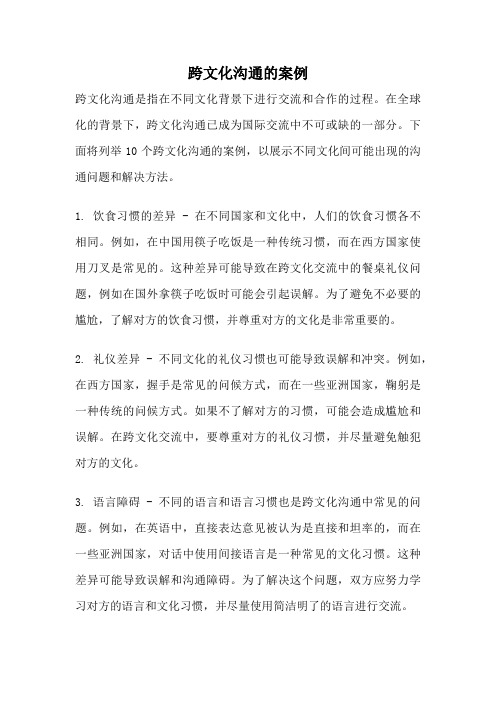
跨文化沟通的案例跨文化沟通是指在不同文化背景下进行交流和合作的过程。
在全球化的背景下,跨文化沟通已成为国际交流中不可或缺的一部分。
下面将列举10个跨文化沟通的案例,以展示不同文化间可能出现的沟通问题和解决方法。
1. 饮食习惯的差异 - 在不同国家和文化中,人们的饮食习惯各不相同。
例如,在中国用筷子吃饭是一种传统习惯,而在西方国家使用刀叉是常见的。
这种差异可能导致在跨文化交流中的餐桌礼仪问题,例如在国外拿筷子吃饭时可能会引起误解。
为了避免不必要的尴尬,了解对方的饮食习惯,并尊重对方的文化是非常重要的。
2. 礼仪差异 - 不同文化的礼仪习惯也可能导致误解和冲突。
例如,在西方国家,握手是常见的问候方式,而在一些亚洲国家,鞠躬是一种传统的问候方式。
如果不了解对方的习惯,可能会造成尴尬和误解。
在跨文化交流中,要尊重对方的礼仪习惯,并尽量避免触犯对方的文化。
3. 语言障碍 - 不同的语言和语言习惯也是跨文化沟通中常见的问题。
例如,在英语中,直接表达意见被认为是直接和坦率的,而在一些亚洲国家,对话中使用间接语言是一种常见的文化习惯。
这种差异可能导致误解和沟通障碍。
为了解决这个问题,双方应努力学习对方的语言和文化习惯,并尽量使用简洁明了的语言进行交流。
4. 时间观念的差异 - 在不同文化中,人们对时间的看法和使用也可能存在差异。
例如,在一些西方国家,时间被视为有限的资源,因此非常重视准时。
而在一些亚洲国家,时间更加弹性,更注重人际关系。
这种差异可能导致在跨文化交流中的时间安排问题,例如迟到或提前到达。
为了解决这个问题,双方应尊重对方的时间观念,并提前沟通好时间安排。
5. 信任建立的困难 - 在跨文化沟通中,建立信任是非常重要的。
然而,由于文化和语言的差异,建立信任可能会变得更加困难。
例如,在一些亚洲国家,人们更注重关系和人情味,建立信任需要更多的时间和努力。
因此,在跨文化交流中,要耐心地建立信任,并尊重对方的文化和价值观。
专业的跨文化交际案例

专业的跨文化交际案例跨文化交际是指在不同文化背景下,通过言语、行为、符号等交流方式进行沟通和交流。
在全球化的背景下,跨文化交际能力对于个人的发展和组织的成功都至关重要。
本文将通过探讨两个专业领域中的跨文化交际案例来说明其重要性和应用价值。
案例一:国际商务谈判在国际商务谈判中,来自不同文化背景的商业代表需要进行有效的交流和合作,以达成双方的商业目标。
在这个案例中,我们以中美商务谈判为例进行分析。
首先,双方代表应该了解对方文化的基本特点,包括礼仪、信仰、价值观等。
比如,在中国文化中,注重面子、人情关系和家庭价值观是非常重要的,因此,美国代表在与中国代表交流时需要注意这些方面,尊重对方的价值观念并避免冒犯。
而在美国文化中,效率、个人主义和直接表达观点是更为重要的,中国代表在与美国代表交流时需要注意这些方面,尽量简洁直接地表达自己的意思。
其次,语言和非语言交流也是关键因素。
在跨文化交际中,语言的语法、词汇和语调都可能引起误解或歧义。
因此,双方代表需要学习对方的语言并尽量准确表达自己的意思。
此外,非语言交流也是重要的,包括肢体语言、面部表情和眼神交流等。
双方代表需要学习对方的非语言信号并适应对方的文化习惯。
最后,文化敏感性和适应性是跨文化交际的关键能力。
双方代表应该具备对文化差异的敏感性和包容性,能够尊重和理解对方的文化,积极适应对方的习惯和方式。
在解决问题和处理冲突时,双方代表应该以合作的态度出发,共同寻求解决方案。
案例二:国际教育交流国际教育交流是指不同国家的学生和教育工作者之间的交流与合作。
在这个案例中,我们以中国留学生在美国大学的学习经历为例进行讨论。
首先,语言能力对于留学生的学习和交流至关重要。
留学生需要具备足够的英语能力,以便与教师和同学进行有效的交流和学术表达。
此外,留学生还需要学习和理解美国大学的学术规范和要求,在论文写作、演讲和参与课堂讨论时能够适应并符合美国学术界的要求。
其次,文化适应能力也是留学生必备的技能。
中日跨文化交际案例
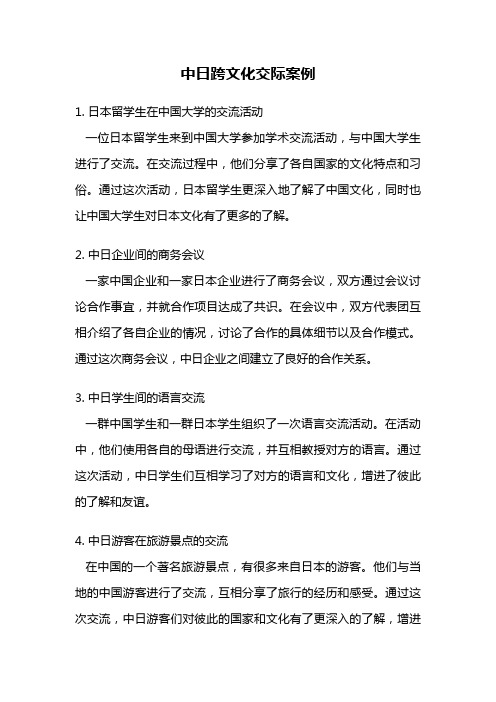
中日跨文化交际案例1. 日本留学生在中国大学的交流活动一位日本留学生来到中国大学参加学术交流活动,与中国大学生进行了交流。
在交流过程中,他们分享了各自国家的文化特点和习俗。
通过这次活动,日本留学生更深入地了解了中国文化,同时也让中国大学生对日本文化有了更多的了解。
2. 中日企业间的商务会议一家中国企业和一家日本企业进行了商务会议,双方通过会议讨论合作事宜,并就合作项目达成了共识。
在会议中,双方代表团互相介绍了各自企业的情况,讨论了合作的具体细节以及合作模式。
通过这次商务会议,中日企业之间建立了良好的合作关系。
3. 中日学生间的语言交流一群中国学生和一群日本学生组织了一次语言交流活动。
在活动中,他们使用各自的母语进行交流,并互相教授对方的语言。
通过这次活动,中日学生们互相学习了对方的语言和文化,增进了彼此的了解和友谊。
4. 中日游客在旅游景点的交流在中国的一个著名旅游景点,有很多来自日本的游客。
他们与当地的中国游客进行了交流,互相分享了旅行的经历和感受。
通过这次交流,中日游客们对彼此的国家和文化有了更深入的了解,增进了友谊。
5. 中日翻译团队的合作一家中国公司和一家日本公司进行了合作,需要进行文件的翻译工作。
双方组建了一个翻译团队,由中日双方的翻译人员共同完成翻译任务。
在合作过程中,双方翻译人员通过讨论和交流,解决了翻译中的难题,确保翻译质量和准确性。
6. 中日艺术家的文化交流一位中国艺术家和一位日本艺术家进行了文化交流活动。
他们互相分享了各自的艺术作品和创作理念,并进行了艺术作品的展示和评论。
通过这次交流,中日艺术家们互相学习和借鉴了对方的创作方法和风格,推动了两国艺术的交流与发展。
7. 中日大学间的学术合作一所中国大学和一所日本大学进行了学术合作,双方共同开展了研究项目。
研究团队由中日双方的教授和学生组成,进行了研究课题的讨论和实验。
通过这次合作,两所大学在学术研究上取得了共同的成果,提升了双方的学术水平。
跨文化交际真实案例
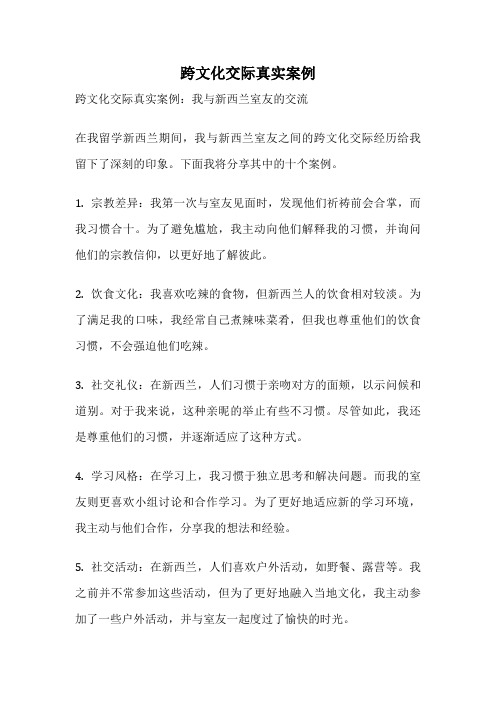
跨文化交际真实案例跨文化交际真实案例:我与新西兰室友的交流在我留学新西兰期间,我与新西兰室友之间的跨文化交际经历给我留下了深刻的印象。
下面我将分享其中的十个案例。
1. 宗教差异:我第一次与室友见面时,发现他们祈祷前会合掌,而我习惯合十。
为了避免尴尬,我主动向他们解释我的习惯,并询问他们的宗教信仰,以更好地了解彼此。
2. 饮食文化:我喜欢吃辣的食物,但新西兰人的饮食相对较淡。
为了满足我的口味,我经常自己煮辣味菜肴,但我也尊重他们的饮食习惯,不会强迫他们吃辣。
3. 社交礼仪:在新西兰,人们习惯于亲吻对方的面颊,以示问候和道别。
对于我来说,这种亲昵的举止有些不习惯。
尽管如此,我还是尊重他们的习惯,并逐渐适应了这种方式。
4. 学习风格:在学习上,我习惯于独立思考和解决问题。
而我的室友则更喜欢小组讨论和合作学习。
为了更好地适应新的学习环境,我主动与他们合作,分享我的想法和经验。
5. 社交活动:在新西兰,人们喜欢户外活动,如野餐、露营等。
我之前并不常参加这些活动,但为了更好地融入当地文化,我主动参加了一些户外活动,并与室友一起度过了愉快的时光。
6. 语言障碍:刚来新西兰时,我的英语水平有限,与室友交流存在一定困难。
为了克服语言障碍,我努力学习英语,并与室友多进行口语练习。
他们也很耐心地帮助我纠正语法错误和提升口语表达能力。
7. 文化节日:在新西兰,有许多与当地文化和传统有关的节日。
我利用这些机会了解当地的文化,并主动参加庆祝活动,与室友一起分享和学习。
8. 生活习惯:我在中国习惯于早睡早起,而我的室友则喜欢熬夜。
为了避免互相打扰,我们商量后制定了一些规则,例如在晚上安静不吵闹,相互尊重对方的作息时间。
9. 交通规则:在新西兰,驾驶习惯与中国不同。
我刚来时并不熟悉当地的交通规则,但我室友很耐心地向我解释,并带我一起学习和适应当地的交通环境。
10. 价值观差异:我来自一个重视家庭观念的文化,而我的室友则更注重个人独立和自由。
- 1、下载文档前请自行甄别文档内容的完整性,平台不提供额外的编辑、内容补充、找答案等附加服务。
- 2、"仅部分预览"的文档,不可在线预览部分如存在完整性等问题,可反馈申请退款(可完整预览的文档不适用该条件!)。
- 3、如文档侵犯您的权益,请联系客服反馈,我们会尽快为您处理(人工客服工作时间:9:00-18:30)。
Lisa is from America and she is visiting a Chinese family. Next is a conversation between Lisa and Wang --- the host of the family.Wang: Hi! Lisa, welcome! Come in. come in.Lisa: Thank you for your invitation. It’s a lovely room and very warm in here.Wang: My room is very small and untidy. Please sit down and have a cup of tea. You must be tired after the long walk here.Lisa: What a strange thing to say--- your room is perfectly clean and tidy! And as for the walk, I’m very strong, you know. I usually walk for at least half an hour every day. Don’t you think walking is a good way to keep fit?Wang: Yes, I do. Dinner is ready. Please sit here facing the door. According to the Chinese custom, this is the seat for the most distinguished guest.Lisa: Thank you. I feel most honored. Wow! So many dishes---eight! They look very tasty.Wang: I prepared the dishes myself. I’m sorry that I’m not a very good cook. Here are only a few cold dishes. Please try this fish, though I’m not very good at cooking fish, I’m afraid.Lisa: This is delicious.Narrator: Later on in the meal, just before they finish the cold dishes, eight hot dishes are placed on the table.Lisa: Another eight!跨文化交际学概论第七章社会交往五、宴请招待P132Case one: Setting rules for a Guest---American HospitalityWang Zhang Tao travelled in America, he lived in the home of his American friend, Bill. Once after he had traveled back, he found Bill was in a bad mood. When he asked what the problem was, Bill told Zhang Tao that his son Adam furious about the noise Zhang made when walking upstairs and also because he was using too much water in the solarpowered shower and Adam had to have his shower in cold water. Billtold Zhang Tao that he should walk more softly in future, have a fast shower to save water. Zhang Tao felt uneasy. How could the host set such rules for his guest!Question: Why did Zhang Tao feel uneasy?分析:1) In China, when people host someone, they put the guest in the place of honor to show hospitality. They try to take care of the guest, and try to make the guest feel comfortable and at ease.2) In America, people tend to give the guest great freedom and treat a guest more casually, naturally and truthfully.3) Zhang Tao knew he was a guest, and thought in terms of Chinese expectations of hospitality. He thought Bill should treat him courteously instead of setting rules for him.4) Since Zhang Tao lived in American surroundings, he should have known about the customs there sooner.Case two:Lin had travelled 20 hours from Beijing to New York. He needed a good meal. His American friend, Mike, met him. But Mike only offered him a plate of roasted chicken and a glass of orange juice. Lin was used to having a main course, and asked Mike if he had any rice. Mike said he only had fried noodles, and Lin had to make do with it. Though Lin knew American s didn’t care very much about what food they ate, hestill felt surprised because he had taken Mike to the most famous duck restaurant in Beijing ---Quanjude—when he arrived in Beijing.分析:1) On the topic of hospitality, the Chinese stress on warmth and demonstrating friendship. They take the guest to a famous or luxurious restaurant to have a very good (expensive) meal to show their hospitality. And the Chinese are used to having a big meal. The more dishes they put out,the greater the warmth and friendship they show.2) In western countries, people stress on freedom. They give the guest great freedom to choose their own foods. And westerners tend to have only one main course and some juice or dessert,which is viewed as casual in the eyes of the Chinese.3) Lin lived in American surroundings and should have adjusted himself quickly to the mew world (lifestyle). He should have known the custom there first, and felt more at ease in Mike’s home.Case three: Equality or Hospitality for Table MannersCase: Lin Hua has accompanied an American delegation to visit China. They have experienced the hospitality of the Chinese people. After returning to America, Linhua once visited them. They were so glad to meet again. Linhua offered to host the meal, but they refused. They ordered their own dish, and Linhua ordered her own. When footing the bill, they only paid their part, and no one wanted to pay for Linhua. Linhua found them so inhospitable, though she knew the Americans would usually pay for their own food.Question:Why did Linhua find them inhospitable?分析:1)In China, to show hospitality, people tend to host the meal. And if they cannot do this, they at least will struggle to pay for the guest.2) In America, people tend to pay for themselves to show equality and independence.3) Linhua knows this custom, but from a Chinese point of view, shestill finds this hard to accept, and feels it a little inhospitable.Case four:I have an American friend. I have invited him several times, and atlong last he invited me to his home one day. He told me to get thereat 3 . I thought we could chat and have a meal together. I have him a Chinese calendar, a woman’s scarf and a bottle of Chinese white wine. He only took out a dish of nuts, a plate of bread and a bottle of wine. After two hours’ chat, I found there was no hint of a meal and said good-bye to him. He only gave me a box of chocolate as a present forthe New Year. After I got home, I found the box already been opened. I was very surprised.Question: What surprised me?分析:1)In China, a visit to home always includes a meal. And the guest always brings a relatively expensive present to the host. And the present should be well wrapped or untouched.2)In the west, a visit to home only means a meeting, not necessarily including a meal. And the present is treated not as importantly as itis in China.3)I acted in a way that was based on Chinese customs, so I felt the American way was very interesting (uneasy).Case Five: Way of Entertaining Guests in China--- Drink more and moreCase:Tom , an American, went to a Chinese home for the first time. He was offered some tea. Just when the first cup was about to finish, moretea was added. He drank the second cup. Then the cup was filled thethird time. Then he drank it, then …until he was quite full. Tom was totally confused by the way of entertaining.Question:Why was Tom totally confused?1)Traditional Chinese custom requires that during the course of entertaining, the host has to always pour more wine or tea to the guest’s glass or cup, and always adds more food to the guest’s plate or bowl without asking whether it’s wanted.2) Chinese guests know how to respond to this type of hospitality.They simply leave the wine, tea, or food in the container and stop having any more. But Tom, the American guest in the case didn’t know this.3) He followed the politeness rule of his culture: it’s not good manners to leave food in one’s own plate at a dinner table. Therefore, without any knowledge of the differences between the two cultures, an American guest would very likely suffer from either drinking or eating too much in such a situation.。
